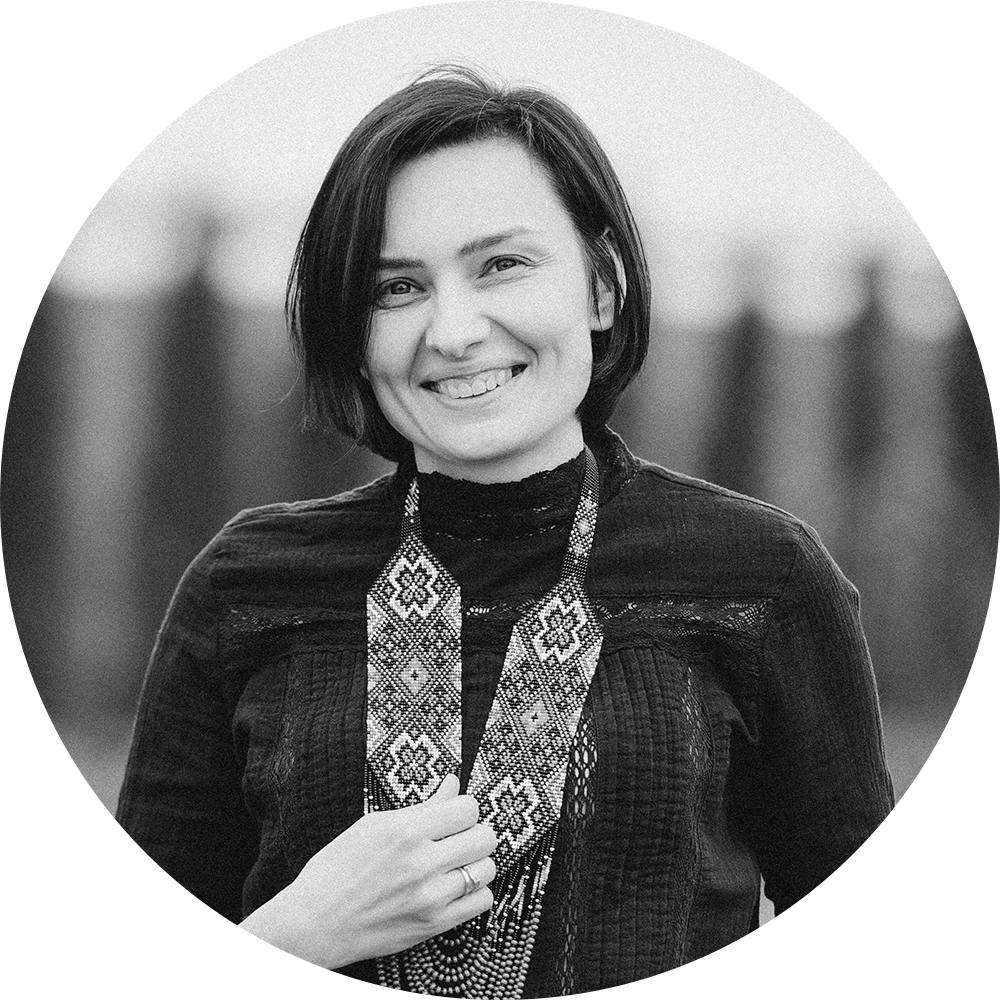
Earlier this year, the Ukrainian translation of Tackling Trauma was published in cooperation with the Eastern European Institute of Theology (Lviv, Ukraine). By the beginning of summer, two print runs had sold out, and interest in the book continues to grow. War in Ukraine has placed Ukrainian churches to support those who are victims of war and violence and who live with severe traumatic experiences.
Tackling Trauma is the first comprehensive practical guide to working with trauma survivors from a Christian perspective in Ukrainian. We spoke to several pastors and theologians who shared their experiences and further prospects for using the book in ministry with Ukrainian survivors of war.

Lina Borodynska
Lina is a PhD candidate of Historical Sciences, author of articles and books on the history of Western Ukrainian Protestantism and assistant editor-in-chief for the Christian Family magazine (Smirna Publishing House). She is a mother of three and lives in Rivne.
I see trauma as an emotional imprint left in a person’s soul by physical, psychological or moral events that affect their future. Unfortunately, most of us, including Christians, have been traumatised since childhood because we were raised by traumatised parents. With the beginning of a full-scale war, I started to reflect on how the social cataclysms that Ukrainians are experiencing will affect their families. To predict the future, one needs to learn about the past, so I started researching the fates of several families who had undergone similar upheavals during the Second World War, including both of my grandparents.
One of my grandfathers was murdered, and my grandmother was afraid to discuss his death with her children because of the political reason behind the murder. My other grandfather was in exile because he refused to fight. He also suffered psychological trauma, so he never spoke about what had happened to him in the camp. Both families could not express their pain. Today, they explain that they belonged to the silent generation. The children of these war trauma survivors – the youngest son raised by a widow, deprived of the concept of fatherhood, and a girl unloved and left to fend for herself – grew older and started a family. They found it difficult to pass on love to the children since their primary concern was their own survival. The wrecked lives of their parents impacted me.
The current [Russia-Ukraine] war has made the concept of trauma extremely relevant, forcing us to comprehend it more deeply, to look for a way out for ourselves and to keep in mind the more traumatised relatives, friends, fellow citizens and veterans who will need our help or, at least, our understanding and acceptance today and in the future.
Traumatised Christians have a protection resource: hope in God, the understanding that God will not give more than one can handle, and God’s help as a primary focus. However, on the other hand, there is a trusted church environment where abiding the law, having virtue, morality, and spiritual sensitivity makes Christians vulnerable to the world’s cruelty.
There is also a misconception among Christians that believers do not suffer from depression, that Christian soldiers are safe from PTSD, that no violence can occur in Christian families, but, unfortunately, that is not true. I witnessed how Christians denied reality because it did not meet the stated standard. They began to pretend they were fine, although they were not, making it impossible to overcome the traumatic event and receive healing.
Tackling Trauma seamlessly combines the biblical worldview, theological understanding of biblical texts and practical tips for working with people who have experienced trauma. The reflections on forgiveness are extremely valuable: this concept has been subject to manipulation, and such a step is difficult for Ukrainians to make today, partly because of the misunderstanding of what forgiveness is. We learn about the terrible pain of other nations, perhaps much more profound than ours, marked by powerlessness and despair. One begins to comprehend that Ukrainian unity and faith in victory make the situation less hopeless and help to stay afloat.
It is worth noting that most people involved in ministry today have the resources to work with the traumatised. Still, they may be unaware of how to utilise them effectively. The authors in the book comprehensively explain how to channel one’s spiritual and social experience into work with traumatised people. Take a great tip from Naji Abi-Hashem: “In order to encourage spiritual vitality and health, find out whether faith is part of the problem or a solution in their lives.”
The experience of the authors and Ukrainian psychologists suggests that the methods offered in Tackling Trauma are highly effective, such as using a person’s creative and artistic capabilities and finding a resource for healing in local traditions, symbols, holidays and ideas.
The book is permeated with the comprehension that God himself, in the person of Christ, has experienced and overcome the most profound physical, emotional and moral trauma, which makes him “our Safe Place” (Ida Glaser). Reading Tackling Trauma is impossible without tears of emotion and compassion. It gives delight in the discovered truths and inspires us to notice the pain of others, but most of all, it reveals the power of God in a unique way.

Daria Morozova
Dr. Morozova holds a PhD in Theology with a specialism in patristics and theological anthropology and is a visiting researcher at the University of Exeter.
From the Christian standpoint, living through trauma can deepen faith: encouraging prayer, trust in God, the proper order of life priorities, etc. At the same time, it harms every person, including Christians, depleting their mental wellbeing. Accordingly, in Ukrainian society, which has been living under constant stress for more than a year, reactions to the slightest stimuli are exacerbated, while the assessments of the environment become simplistic and polarised. In religious life, it leads to an aggravation of inter-church controversies and outbreaks of violence. One of the imperatives in this situation is to restore a broad, holistic picture of life and the ability to see its complexity.
Tackling Trauma is useful and relevant for Ukrainian society today, primarily because it draws attention to the diagnostics of trauma and its treatment. Although developments in this area exist in all traditions of Christianity, they rarely feature as a unified, consistent strategy and remain little-known to clergy and laity. The book will help churches in Ukraine develop the ability to recognise the healing potential of Christianity and channel it into solving a pressing problem – helping the victims. In the light of various psychological approaches, the hermeneutics of Scripture draws attention to biblical resources that can inspire professional psychologists, pastors, social workers, volunteers, and victims to find constructive mechanisms for dealing with trauma.

Anatoliy Denysenko
Dr. Denysenko specialises in philosophical theology and is Senior Research Fellow at the Eastern European Institute of Theology, Lviv.
Defining trauma can be difficult. Perhaps it is the emptiness in our souls. As a philosopher, I believe all people live through some traumatic experience. I am hesitant to say whether my understanding of trauma changed following the 24th of February 2022; rather, it has become more acute. I see more clearly now that everyone has some fracture inside, because of the war in particular.
Trauma is a painful experience, but once it happens to us, trauma is not necessarily a thing that needs to be eliminated but rather something we need to learn to live with. The biggest problem with modern psychology is that it tries to “cure” the patient, considering trauma unnatural. From a theological standpoint, humanity inherited Adam’s trauma, the emptiness, which means we have been traumatised by sin since birth. What we can do about it is accept the trauma and learn to move forward with it.
The Bible was written from the standpoint of a traumatised, weak, wounded, rejected person whose texts would be composed by those living in the “shadows of the empire.” The Scriptures are primarily a text written by Jews in various colonial eras. For the most part, the authors did not have their land or place of worship; they went through exile, faced misunderstandings, experienced internal turmoils, and stayed in their own “mental deserts.” When we read the Bible this way, it becomes evident that the authors were not strangers to us. They, just like us, went through and made sense of wars, genocides, losses, and persecutions. They faced spiritual and physical evil, which left an imprint on their bodies and souls. Through the stories and teachings of the “heroes of faith,” the Bible invites readers to walk with those heroes on a difficult earthly journey.
I believe that one of the main objectives of pastors, caregivers, and psychologists is to teach the traumatised how to move forward with their trauma. Not to drown out the pain with a “positive philosophy,” not to run away from it, not to deceive themselves with self-conviction and belief in a painless utopian life. We should accept that we have been traumatised by this war and continue to learn to build our lives based on a traumatic experience.

Vitaliy Roshchyna
Vitaliy holds an MTh and is pastor of Horokhiv Pentecostal Church, and Deputy Bishop of the Volyn Region Evangelical Christian Association.
For me, trauma is, first and foremost, a tragedy that abruptly halts one’s life, leading to helplessness and indescribable worry. Although stress, trials, and trauma often follow the essence of being a Christian, they come when you least expect them. After 2014, the tragic war in the East of Ukraine had subconsciously become usual and far-off, since I live in the Western part of the country, bordering Poland. My prayer for peace in Ukraine had probably become mundane. But I will never forget the phone call from my wife at 7.30 am on the 24th of February. When I picked up the phone and heard my wife’s anxious voice asking what we should do, I woke up instantly and started to pray for God’s guidance. From that moment on, and throughout the day, my phone was ringing off the hook. My church members are from different parts of Ukraine, not far from the front line, and were leaving their homes and running away. They would ask for help, shelter and support. The phone calls and meetings with the victims let me hear, see and feel their pain and hopelessness. Full-scale war has brought and is still bringing significant trauma, a severe wound primarily inflicted on the human soul.
Based on my pastoral experience, trauma primarily causes a loss of inner peace, tranquillity and hope for a believer, leading to the destruction of relationships in the family, at work, and in religious society. The hardest thing to witness is how the victims lose faith in God. Currently, the most crucial thing for pastors, Christian psychologists, or counsellors is to provide support and proper care. Today, I see the need of the people in Ukraine for those who can see the traumatised and provide help, both in churches and beyond.
Tackling Trauma is a timely response to the challenge the pastors face when counselling the victims and traumatised by the hostilities in Ukraine. I would therefore like to express my sincere gratitude to the Eastern European Institute of Theology, who published the Ukrainian translation of this book and it is now available to read for Ukrainian pastors and caregivers.
The relevance of the book lies primarily in the fact that it contains several different essays in which the authors explore, and give a certain theological assessment of, the traumas of the people and countries that have suffered the scourge of war or other kinds of tragedy. Based on their own experience and Scripture, they offer a list of recommendations for pastors or caregivers concerned with the treatment of the traumatised. The book helps us focus more on the texts about love, forgiveness, God’s protection, suffering, and justice.
Tackling Trauma – Ukrainian Edition
Global, Biblical, and Pastoral Perspectives
ISBN: 9781839738715
Format: Paperback
Pages: 384
This article was first published by LanghamLiterature.org